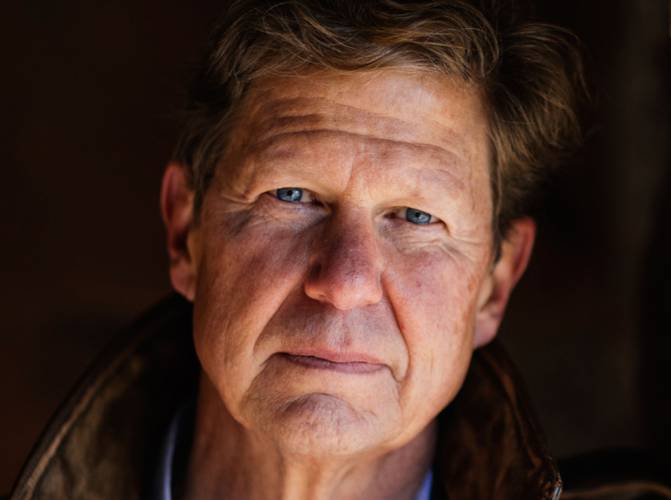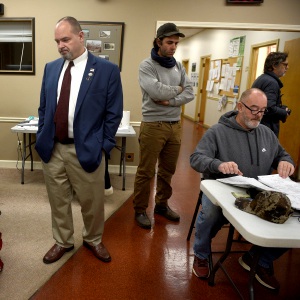By the Way: A white nationalist’s many mistruths
|
Published: 04-05-2024 5:34 PM
Modified: 04-08-2024 10:34 AM |
Tony Perkins, head of the Family Research Council, a Religious Right organization, has a history of involvement with the Ku Klux Klan in his home state of Louisiana. In 1996, while running the unsuccessful U.S. Senate campaign of his friend and mentor, Woody Jenkins, Perkins contracted with Klan Imperial Wizard David Duke’s organization, Impact Mail & Printing, for automated phone calls.
The Federal Election Commission later determined that the campaign, in an apparent attempt to hide the Klan connection, “knowingly and willfully filed false disclosure reports.”
While serving as a legislator in Louisiana, Perkins addressed the state chapter of the Council of Conservative Citizens (CCC) on May 17, 2001, in the state capital. The CCC, a white supremacist organization widely known as the “uptown Klan,” on its website once described African Americans as a “retrograde species of humanity.”
A newspaper photograph captured Perkins smiling broadly, standing in front of a Confederate flag at Bonanno’s Restaurant in Baton Rouge. When challenged on his association with a racist group, Perkins claimed that he was unaware of its history.
Here’s a tip, genius. If you’re addressing a room full of white faces with a Confederate flag at your back, it’s probably not the local chapter of UFO enthusiasts.
These tawdry associations have not deterred Perkins from parading as an arbiter of morality, despite his support for Donald Trump. From his perch as head of the Family Research Council, which the Southern Poverty Law Center classifies as a hate group, Perkins rails against Islam, same-sex marriage and LGBTQ+ rights.
And most recently, he has set his sights on Politico.
In response to Heidi Przybyla’s article about Christian nationalism, Perkins together with Brian Burch of Catholic Voice, sent a letter of protest alleging Przybyla’s “disqualifying lack of knowledge of the United States of America’s founding documents and a profoundly prejudicial view toward American religious groups.”
Article continues after...
Yesterday's Most Read Articles
 Herd departs Hartford’s last remaining dairy farm
Herd departs Hartford’s last remaining dairy farm
 Bald eagles are back, but great blue herons paid the price
Bald eagles are back, but great blue herons paid the price
 At Dartmouth, hundreds protest ongoing war in Gaza and express support for academic freedom
At Dartmouth, hundreds protest ongoing war in Gaza and express support for academic freedom
 Kenyon: What makes Dartmouth different?
Kenyon: What makes Dartmouth different?
 A Life: Richard Fabrizio ‘was not getting rich but was doing something that made him happy’
A Life: Richard Fabrizio ‘was not getting rich but was doing something that made him happy’
The letter continues to advance the demonstrably false narrative that the United States was founded as a Christian nation. Apparently, Perkins’s dissembling knows no limits.
Once more, for the record: The founders, well aware of the wars of religion in Europe and England, explicitly specified that the new government should have no entanglement with religion. The First Amendment is abundantly clear: “Congress shall make no law respecting an establishment of religion or prohibiting the free exercise thereof.”
Paradoxically, Perkins should take comfort in the very amendment he seeks to subvert.
However warped his views on theology or race or sexuality, he has every right to them under the “free exercise” clause. In addition, by creating a free marketplace for religion and disentangling it from the state, the First Amendment has ensured a religious vitality in the United States unmatched anywhere in the world.
Although Perkins himself has benefited from the “free exercise” provision, he cannot ignore the first clause of the First Amendment, the part about prohibiting religious establishment, thereby, in Thomas Jefferson’s words, constructing a “wall of separation between church and state.”
Perkins and his right-wing compatriots also like to assert that the founders themselves were evangelical Christians. This is so ludicrous that I’m tempted not to dignify it with a response. Jefferson himself excised references to Jesus’ divinity and miracles from the New Testament; this expurgated version, published posthumously, has come to be known as the Jefferson Bible.
Jefferson expressed his fondest hope that Americans would eventually embrace the “rational Christianity” of Unitarians, those who believe that Jesus was a moral exemplar, but not the son of God. Indeed, no founder, with the possible exception of John Witherspoon, Presbyterian minister and president of the College of New Jersey, or Benjamin Rush, a physician, would qualify for membership in any of the churches now advocating for Christian nationalism.
Finally, the Treaty of Tripoli was negotiated during the George Washington administration, sent to Congress by John Adams and ratified unanimously by the U.S. Senate on June 7, 1797. The treaty reads in part, “The government of the United States of America is not in any sense founded on the Christian religion.”
Pointing out the fallacies and distortions of Christian nationalism in no way represents “a profoundly prejudicial view toward American religious groups,” as the letter from Perkins and Burch asserts. It’s simply an attempt to set the record straight and counter the false information propagated by Perkins and his ilk.
Perkins has every right to spout whatever bigoted or white supremacist notions he wishes to spread; the second part of the First Amendment guarantees freedom of speech. The rest of us have the responsibility to refute such nonsense.
Randall Balmer, a professor at Dartmouth College, is the author of “Solemn Reverence: The Separation of Church and State in American Life.”



 Editorial: Chris Sununu’s moral vacuum
Editorial: Chris Sununu’s moral vacuum Editorial: Gambling tarnishes America’s sporting life
Editorial: Gambling tarnishes America’s sporting life Column: The age-old question of what to read
Column: The age-old question of what to read Editorial: Transparency wins in NH Supreme Court ruling
Editorial: Transparency wins in NH Supreme Court ruling
